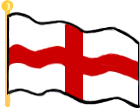Rowsty Dowt, My Fire's All Out
There's another version of Rowsty Dowt called I Doubt, I Doubt, My Fire Is Out.
Rowsty Dowt, My Fire's All Out
Nursery Rhyme
Rowsty dowt*, my fire's all out,
My little dame is not at home!
I'll saddle my duck, and bridle my hen,
And fetch my little dame home again!
Home she came, tritty, trot,
She asked for the porridge she left in the pot;
Some she ate and some she shod**,
And some she gave to the truckler's*** dog;
She took up the ladle and knocked its head,
And now poor Dapsy dog is dead.
Notes
*"Rowsty Dowt" is probably nonsense. FYI According to the Oxford English Dictionary, "Rowsty" is the obsolete form of "rusty", and "dowt" is the obsolete form of "doubt".
**Shod was the past tense of "shed" and meant poured out or spilled, according to the Oxford English Dictionary. The Oxford Dictionary of Nursery Rhymes wrote, "'Shod' is the old past tense for shed, hence split: so the porridge appears to have been pease-porridge." I think the definition I found in the Oxford English Dictionary (i.e. poured out or spilled) is more straight-forward and makes more sense in this context.
***A truckler is a peddler according to The Annotated Mother Goose and The Oxford Dictionary of Nursery Rhymes. According to The Online Etymology Dictionary, the verb "to truck" meant "to exchange, barter".
Thanks and Acknowledgements
This rhyme can be found in The Mother Goose; Containing All The Melodies The Old Lady Ever Wrote, edited By Dame Goslin (1850). This rhyme can also be found in "Early English Poetry, Ballads and Popular Literature of the Middle Ages" By Percy Society (1841).
























